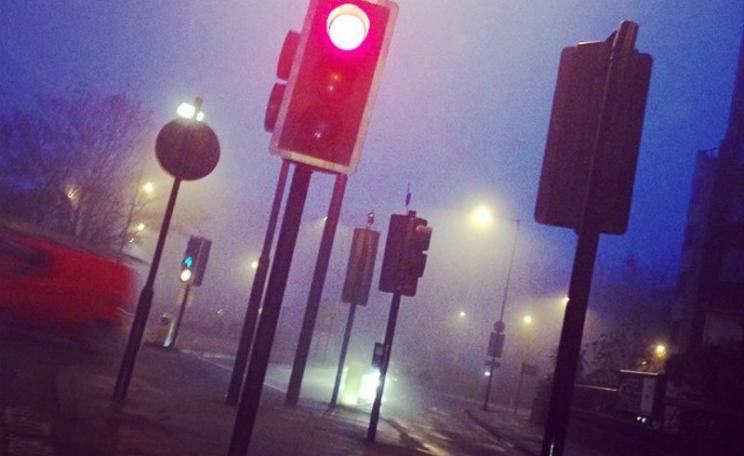If ever the cliché 'win-win' applies, it does so for the reduction of private car use in London; lower road maintenance, less congestion and a more equal distribution of social benefits. Not to mention: Londoners living healthier, longer lives.
Despite publicised efforts to the contrary, air pollution in London has been bad and well above EU guidelines for a very long time.
So it has to be good news that ClientEarth has today sent a final legal warning to the UK government which gives the Environment Secretary, Liz Truss, 10 days to act on air pollution or face action in the High Court.
ClientEarth CEO, James Thornton, said today: "We have had to issue this legal warning to the government because of its failure to produce a plan that would bring air pollution down as soon as possible.
"Despite an order from the UK's highest court, despite tens of thousands of premature deaths in this country every year and despite clear evidence to show that air pollution has a terrible effect on the health of vulnerable groups like children, the government has consistently ducked its responsibility to ensure our right to clean air."
If others have not noticed this threat to health, it has not been lost on asthma suffers (for full disclosure of a special interest; I admit to this affliction).
A recent study estimates that 40,000 people in the UK (9,000 in London) die each year from air-pollution related health conditions, no small proportion of whom suffer from the various forms of asthma.
By way of comparison: London traffic fatalities in recent years have run at an annual figure of less than 200; deaths due to murder fell below 100 in 2014; and the total for all infectious diseases was less than 3000 for the UK as a whole (the morbidity curious can go to the detailed listing).
Just think: if this was a deadly virus pandemic
A year ago a massive scare swept the UK in the wake of the Ebola outbreak in West Africa. Imagine if its arrival in Britain had led to 9,000 deaths over the last 12 months. If nothing else, Chancellor Osborne's squeeze on NHS funding would have come to an abrupt end.
As a last piling on of numbers, total UK military deaths over 15 years resulting from the Afghanistan and Iraq wars combine to less than ten percent of the body count generated by London's air pollution in a day.
If ever the cliché 'win-win' applies, it does so for the reduction of private car use in London; lower road maintenance, less congestion and a more equal distribution of social benefits. Not to mention: Londoners living healthier, longer lives.
These numbers indicate the immediate need for public policy to move beyond permissive measures such as bicycle lanes and more buses, towards ones that have a substantial short term impact. The private automobile is a weapon of mass human destruction, both through the casualties its accidents generate and the lethal gases it emits. Community welfare requires more containment of the private vehicle than present policy provides.
Some might argue - not the least the climate change deniers - that other forms of death are directly treatable, while reducing air pollution in London involves a complex process of cultural and technical adjustment that cannot be done quickly. This argument is false.
Below I list several policy measures that would immediately reduce health-threatening pollution by sharply curbing motor vehicle use (forgive the pun) and require little enabling investment.
Limiting the pollution carnage
The principle behind all the recommendations below is immediate impact, eliminating evasion and minimising negative distributional effects.
1. Raise the congestion charge to £50
At the moment the congestion charge for private automobiles is a paltry £11.50, which goes down by a pound if you pay online. The policy goal should be reducing private cars in the most air polluted parts of London (see pollution map), not generating revenue.
Contrary to observation and common sense, some argue against the pollution charge on grounds of its negative distributional impact - the rich find it easy to pay it, while the non-rich suffer a heavy burden.
A study by the Institute of Fiscal Studies in anticipation of the introduction of the congestion charge concluded that the overall distributional effect would be progressive, supported by analytical and empirical findings in subsequent research on Orange County, California (where, if anything, one would expect to find a regressive impact).
If counter to all common sense and observation there were some repressive impact, my other suggestions would negate that regressiveness and turn it progressive.
2. Prohibit single passenger cars
In response to rising petroleum prices and fears of shortages, in the United States and other countries as far back as the 1970s, local and state governments introduced legislation requiring motorway drivers to have at least one passenger or receive a hefty fine (High Occupancy Vehicle Lanes, HOVL).
Britain has more video surveillance by permanent cameras than any country in the world, many of which the Department of Transport operates (about 180 in London). London Transport could quickly add more cameras. Monitoring whether a vehicle had a passenger other than the driver is a technically trivial matter.
I would recommend a two person minimum, with £100 fine for the first violation and the second time a year's ban from the area defined for multiple occupancy (which would be larger than the current congestion zone). In addition, no single occupant car could enter the congestion zone at any price.
3. Commercial car parks under public control
Any serious reduction in private car use in London requires the public sector to increase regulation of private car parks. Car parks facilitate car use. Limiting access to them reduces driving. It really is that simple. The hard part is working out something effective to do about them.
The first step is for parliament to give the government of London the power to regulate all car parks 'in the interest of public health and safety'. This power would include regulating charges and all conditions of use. Regulations would limit the time a private car could park in commercial garages (for example, two hours with no return to that one or any other) and set a minimum rate (such as £10 per hour).
Planning authorities would no longer approve private car parks, and would not replace those that are demolished. The distributional impact of this policy would be positive, by in effect banning wealthy business people from driving (finding nowhere to park when they arrive).
4. Home deliveries for shopping
Supermarket and department store shopping represent a common use of the private car. Several obvious measures would reduce the need for people to use individual transport for this purpose.
First, all parking areas directly linked and provided by retail shops including supermarkets, department stores and shopping malls would fall under the parking garage regulations described in number three (minimum charges and maximum stay).
Second, all retail outlets - whether or not they have dedicated parking - would be required to provide a home delivery service without charge. Large department stores and supermarkets already do this if the purchase exceeds a minimum cost.
For in-store shopping, supermarkets could do this with the same delivery systems they use for online purchases, with booking in advance. Households typically plan large supermarket shops in advance, so they would easily adapt to advance booking.
5. Discourage the 'school run'
Not as frequent as the supermarket shop, but common, is the use of private vehicles to drop and collect children to and from school. This is largely the preserve of upper-income households, often but not always involving fee-paying schools.
Discouraging the 'school run' would have a positive income distribution impact along with enhancing air quality. To end the school run, the street fronts of schools would be 'no standing' zones, monitored by video cameras, with hefty fines for transgressors.
As an alternative to parental drop-and-collect, fee charging schools could operate buses, which some already do (common in the United States for both public and fee charging schools). Parents concerned about safety of their children could walk them to school - considerably safer than venturing into London traffic.
Taking action
Implementing these five policy measures would represent a major step towards making London's air non-lethal. Implementing the policies would have a major impact no matter what measures were or were not taken elsewhere. This is not a case of 'it makes no difference what we do if the Chinese/Indians/Americans/etc. do not do the same'.
Equally important, all five can be implemented immediately. Once the Commons and the London Assembly put in place legislation to facilitate the policies, implementation would allow a period for adjustment.
During this period, the privately owned bus companies would place their orders for additional vehicles, retailers would arrange for their delivery services, and employees would alter their travel arrangements from private to public transport.
Several enhancing policies would be desirable but not immediately needed:
1. 'Freedom Passes' for those attending schools and universities;
2. discounts for season tickets (perhaps with payment enforced on employers); and
3. requiring taxis and buses to have electric or hybrid engines, with more recharging points.
These proposals are not as radical as they may appear to the lover of private transport. The number of people entering London by private automobile during rush hour has declined in recent years, though almost 30% of workers still commute.
Finally, far from expensive, these five policies could reduce public sector spending. Fewer vehicles in London mean less deterioration of road surfaces and less budgeted expenditure on road maintenance (see Transport for London budget 2014-15). The increases in health would reduce NHS expenditures.
If ever the cliché 'win-win' applies, it does so for the reduction of private car use in London; lower road maintenance, less congestion and a more equal distribution of social benefits. To those benefits I might add the obvious - Londoners living healthier, longer lives.
John Weeks is Professor Emeritus, School of Oriental & African Studies, University of London, and author of Economics of the 1%: How mainstream economics serves the rich, obscures reality and distorts policy, Anthem Press, published earlier this year.
This article was originally published by openDemocracy under a Creative Commons Attribution-NonCommercial 4.0 International licence. It has been updated by The Ecologist with news of Client Earth's legal challenge.






